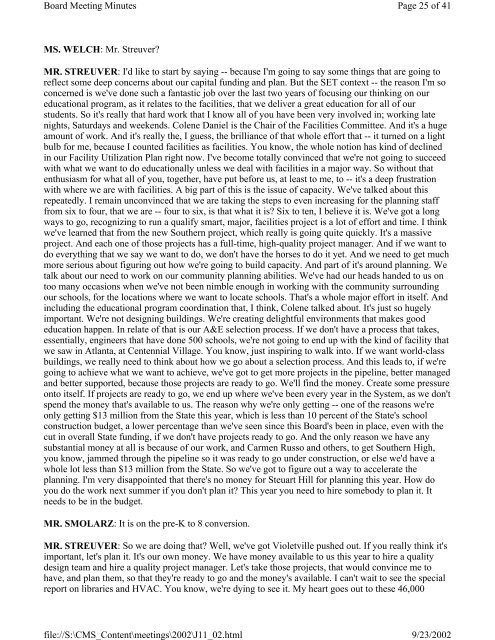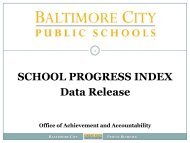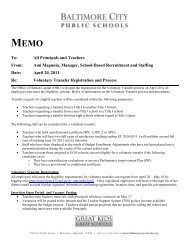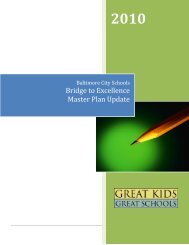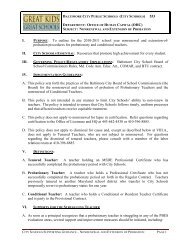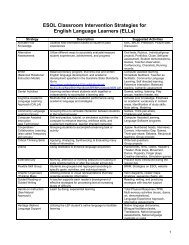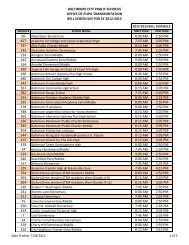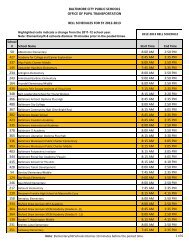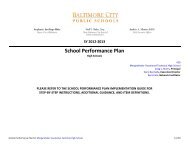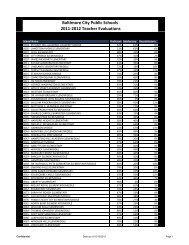June 11, 2002 - Baltimore City Public Schools
June 11, 2002 - Baltimore City Public Schools
June 11, 2002 - Baltimore City Public Schools
You also want an ePaper? Increase the reach of your titles
YUMPU automatically turns print PDFs into web optimized ePapers that Google loves.
Board Meeting Minutes<br />
MS. WELCH: Mr. Streuver?<br />
MR. STREUVER: I'd like to start by saying -- because I'm going to say some things that are going to<br />
reflect some deep concerns about our capital funding and plan. But the SET context -- the reason I'm so<br />
concerned is we've done such a fantastic job over the last two years of focusing our thinking on our<br />
educational program, as it relates to the facilities, that we deliver a great education for all of our<br />
students. So it's really that hard work that I know all of you have been very involved in; working late<br />
nights, Saturdays and weekends. Colene Daniel is the Chair of the Facilities Committee. And it's a huge<br />
amount of work. And it's really the, I guess, the brilliance of that whole effort that -- it turned on a light<br />
bulb for me, because I counted facilities as facilities. You know, the whole notion has kind of declined<br />
in our Facility Utilization Plan right now. I've become totally convinced that we're not going to succeed<br />
with what we want to do educationally unless we deal with facilities in a major way. So without that<br />
enthusiasm for what all of you, together, have put before us, at least to me, to -- it's a deep frustration<br />
with where we are with facilities. A big part of this is the issue of capacity. We've talked about this<br />
repeatedly. I remain unconvinced that we are taking the steps to even increasing for the planning staff<br />
from six to four, that we are -- four to six, is that what it is? Six to ten, I believe it is. We've got a long<br />
ways to go, recognizing to run a qualify smart, major, facilities project is a lot of effort and time. I think<br />
we've learned that from the new Southern project, which really is going quite quickly. It's a massive<br />
project. And each one of those projects has a full-time, high-quality project manager. And if we want to<br />
do everything that we say we want to do, we don't have the horses to do it yet. And we need to get much<br />
more serious about figuring out how we're going to build capacity. And part of it's around planning. We<br />
talk about our need to work on our community planning abilities. We've had our heads handed to us on<br />
too many occasions when we've not been nimble enough in working with the community surrounding<br />
our schools, for the locations where we want to locate schools. That's a whole major effort in itself. And<br />
including the educational program coordination that, I think, Colene talked about. It's just so hugely<br />
important. We're not designing buildings. We're creating delightful environments that makes good<br />
education happen. In relate of that is our A&E selection process. If we don't have a process that takes,<br />
essentially, engineers that have done 500 schools, we're not going to end up with the kind of facility that<br />
we saw in Atlanta, at Centennial Village. You know, just inspiring to walk into. If we want world-class<br />
buildings, we really need to think about how we go about a selection process. And this leads to, if we're<br />
going to achieve what we want to achieve, we've got to get more projects in the pipeline, better managed<br />
and better supported, because those projects are ready to go. We'll find the money. Create some pressure<br />
onto itself. If projects are ready to go, we end up where we've been every year in the System, as we don't<br />
spend the money that's available to us. The reason why we're only getting -- one of the reasons we're<br />
only getting $13 million from the State this year, which is less than 10 percent of the State's school<br />
construction budget, a lower percentage than we've seen since this Board's been in place, even with the<br />
cut in overall State funding, if we don't have projects ready to go. And the only reason we have any<br />
substantial money at all is because of our work, and Carmen Russo and others, to get Southern High,<br />
you know, jammed through the pipeline so it was ready to go under construction, or else we'd have a<br />
whole lot less than $13 million from the State. So we've got to figure out a way to accelerate the<br />
planning. I'm very disappointed that there's no money for Steuart Hill for planning this year. How do<br />
you do the work next summer if you don't plan it? This year you need to hire somebody to plan it. It<br />
needs to be in the budget.<br />
MR. SMOLARZ: It is on the pre-K to 8 conversion.<br />
Page 25 of 41<br />
MR. STREUVER: So we are doing that? Well, we've got Violetville pushed out. If you really think it's<br />
important, let's plan it. It's our own money. We have money available to us this year to hire a quality<br />
design team and hire a quality project manager. Let's take those projects, that would convince me to<br />
have, and plan them, so that they're ready to go and the money's available. I can't wait to see the special<br />
report on libraries and HVAC. You know, we're dying to see it. My heart goes out to these 46,000<br />
file://S:\CMS_Content\meetings\<strong>2002</strong>\J<strong>11</strong>_02.html<br />
9/23/<strong>2002</strong>


